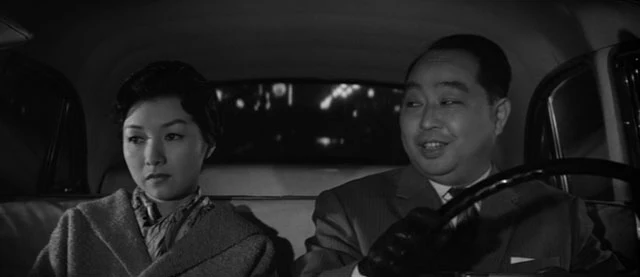 |
| Hideko Takamine in Floating Clouds |
Kengo Tomioka: Masayuki Mori
Sei Mukai: Mariko Okada
Sugio Iba: Isao Yamagata
Kuniko Tomioka: Chieko Nakakita
Seikichi Mukai: Daisuke Kato
Director: Mikio Naruse
Screenplay: Yoko Mizuki
Based on a novel by Fumiko Hayashi
Cinematography: Masao Tamai
Production design: Satoru Chuko
Film editing: Eiji Ooi
Music: Ichiro Saito
Mikio Naruse's Floating Clouds brings to mind some of Ernest Hemingway's stories about war-damaged lovers trying to make the best of a doomed relationship. Yukiko is a young woman returning to Tokyo after working in Japanese-occupied French Indochina as a secretary. There she had an affair with the bitter, cynical Kengo, an employee of the Japanese forest service who is married to the sickly Kuniko. Trying to make it on her own in postwar Japan, Yukiko finds that her secretarial skills are in little demand because she doesn't know English, a necessity under the American occupation. Desperate, she picks up an American soldier and becomes his mistress. Meanwhile, she also seeks out Kengo, and finds him trying to make a go of it in the lumber business, still married to Kuniko but unwilling to divorce her and marry Yukiko. So over the course of the film, these two deeply wounded people meet and part repeatedly, not only lacerating themselves but also hurting others with words and deeds. At the end, they have seemingly found a way to live together, partly by retreating from the world onto a remote Japanese island, but even that rapprochement is ill-fated. Naruse's film is an absorbing downer, gaining much of its energy from our suspense about what the protagonists will do to each other next, as well as a showcase for Hideko Takamine's marvelous performance. There are those who think it a masterpiece.


